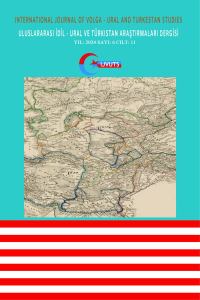Öz
Proje Numarası
1
Kaynakça
- Musayeva, A. (2003). Dede Ömer Rûşeni Elyazmaları Üzerinde Araştırmalar, C. II. Bakü: AMEA Mehemmed Füzuli adına Elyazmalar Enstitüsü.
Öz
The study focuses on the linguistic and semantic archaisms found in the "Divans" of Şeyh İbrahim Gülşan and Dede Ömer Rüşeni, important figures in 16th century classical Turkish literature. Centuries later, the language of the poets has not been sufficiently studied. The examination of the language of the Divan is very important in the study of Turkish history. The examination of the language of classical literature is crucial for the historical perspective of the Turkish language and can play a positive role in enriching the vocabulary of modern Turkish languages. During the research, the Divans of Gülşani and Rövşani, representatives of our classical literature, were studied. Both authors, who lived in the Middle Ages, lived and created in Azerbaijan, as well as in modern Turkey and Egypt. This allows us to follow the development and change speed of Turkish in a wide area during that period. At the same time, we can also observe the differences between the palace language and the simple folk language, which are important details in terms of language history research. The research conducted using a historical comparative method yielded important results. In the article, both Gülşani's life and works and Rövşani's life and works are detailed under different headings. The findings at the end of the study reflect the objective set before the article. In conclusion, many old Turkish words are used in the poet's language.
Proje Numarası
1
Kaynakça
- Musayeva, A. (2003). Dede Ömer Rûşeni Elyazmaları Üzerinde Araştırmalar, C. II. Bakü: AMEA Mehemmed Füzuli adına Elyazmalar Enstitüsü.
Ayrıntılar
| Birincil Dil | Türkçe |
|---|---|
| Konular | Güney-Batı (Oğuz) Türk Lehçeleri ve Edebiyatları |
| Bölüm | Makaleler |
| Yazarlar | |
| Proje Numarası | 1 |
| Yayımlanma Tarihi | 29 Şubat 2024 |
| Gönderilme Tarihi | 26 Kasım 2023 |
| Kabul Tarihi | 12 Şubat 2024 |
| Yayımlandığı Sayı | Yıl 2024 Cilt: 6 Sayı: 11 |


